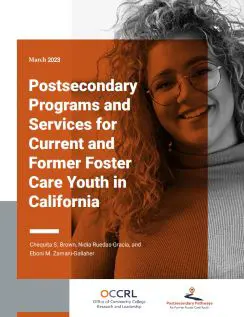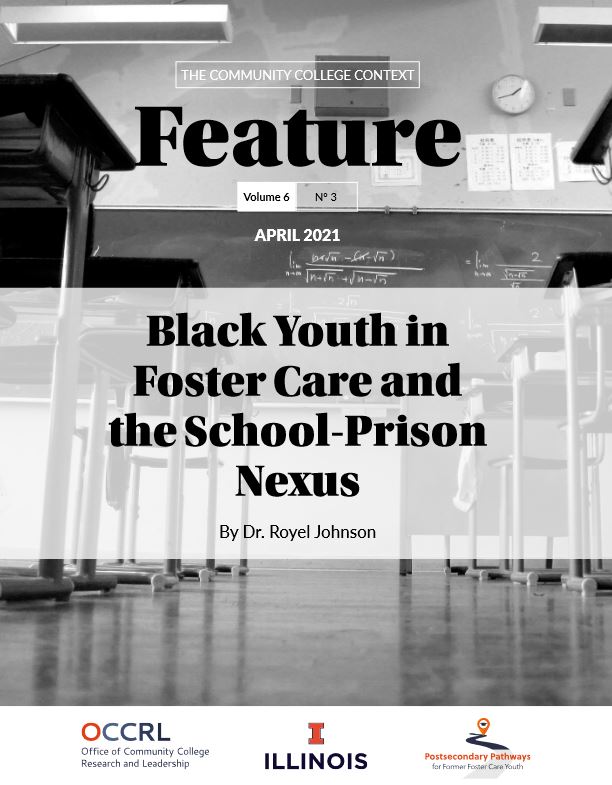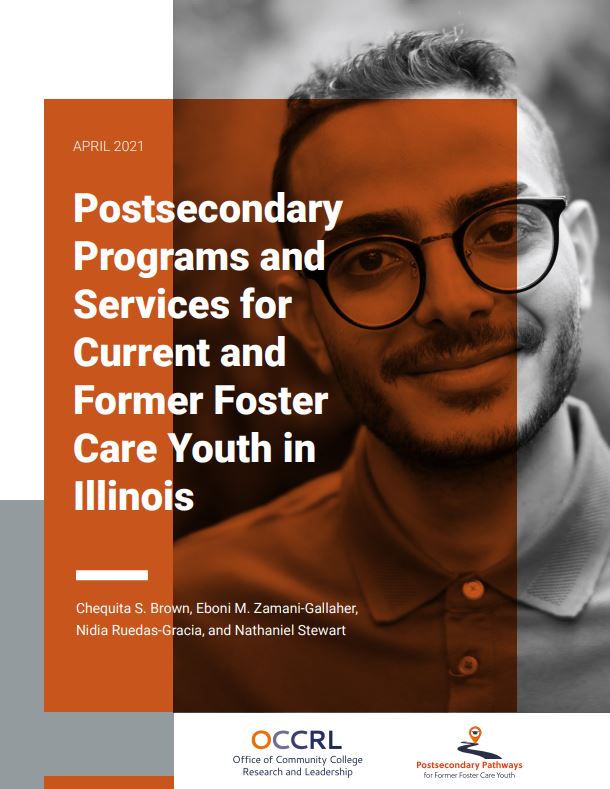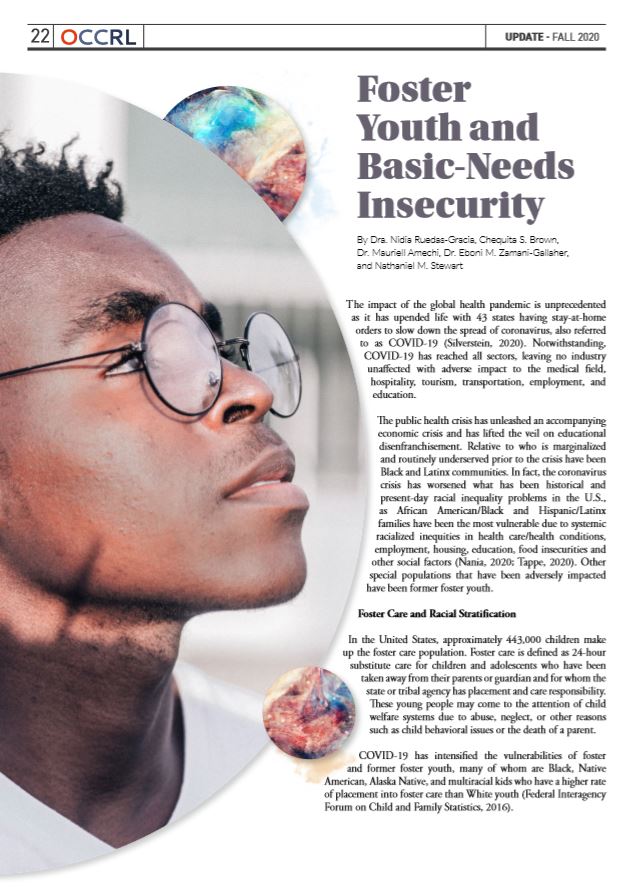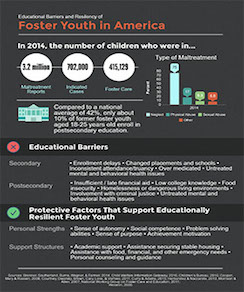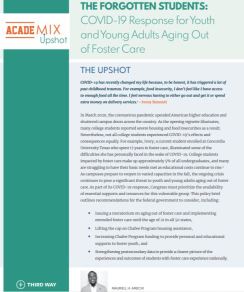
Postsecondary Pathways - for Former Foster Care Youth
This project has been completed and is no longer active.
However, we hope you are able to utilize its resources.
The Postsecondary Pathways for Former Foster Care Youth (PP-FFCY) reflects OCCRL’s commitment to examining and developing postsecondary pathways that support mobility for first-generation, underserved, and minoritized populations, as well as strengthening career pathways to promote seamless transitions from college to careers. This project endeavors to examine postsecondary access, opportunities, and supports for foster youth in Illinois and other states across the county in addressing access and outcomes of FFCY in Career Technical Education (CTE).
Purpose
The Postsecondary Education Pathways for Former Foster Care Youth (PP-FFCY) project is an exploratory study focused on postsecondary pathways for current and former foster youth in Illinois. OCCRL is conducting a comprehensive-needs assessment that provides a descriptive profile of current and former foster youth populations in Illinois; examines postsecondary access, opportunities, and supports for foster youth in Illinois; and addresses disparities in career and technical education (CTE) programs. This project reflects OCCRL’s commitment to examining and developing postsecondary pathways that support mobility for first-generation, underserved, and minoritized populations as well as strengthening and supporting career pathways to promote seamless transitions from college to careers.
Resources
OCCRL aims to increase postsecondary awareness, access, and attainment for current and former foster care youth by providing information on programs and other resources that offer holistic support and services. View the list of postsecondary programs and services.
Strategies to Cultivate a Foster-Friendly Culture on Community College Campuses
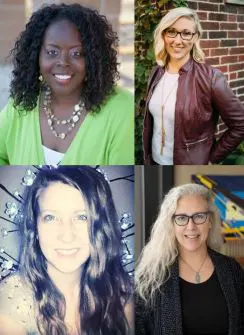 In this episode, Chequita Brown talks with Kate Danielson of the organization Foster Progress, as well as with Anna Wandtke and Tricia Wagner of Rock Valley College in Rockford, Illinois. The group discusses how to cultivate a foster-friendly culture at Illinois community colleges.
In this episode, Chequita Brown talks with Kate Danielson of the organization Foster Progress, as well as with Anna Wandtke and Tricia Wagner of Rock Valley College in Rockford, Illinois. The group discusses how to cultivate a foster-friendly culture at Illinois community colleges.
Navigating College as a Foster Care Alum
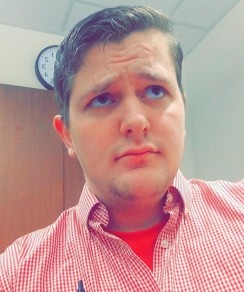 In this episode, OCCRL research assistant Chequita S. Brown talks with Jonathan Stacy, a sophomore at Heartland Community College who is pursuing his studies and a possible career in criminal justice.
In this episode, OCCRL research assistant Chequita S. Brown talks with Jonathan Stacy, a sophomore at Heartland Community College who is pursuing his studies and a possible career in criminal justice.
Listen to the podcast and view the transcript.
Key Elements to Successfully Connecting Foster Care Youth to Educational Resources for Postsecondary Success
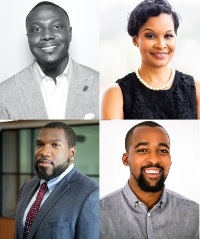 In this episode, Nathaniel Stewart talks with Mauriell Amechi, Regina Gavin Williams, and Blayne Stone Jr. about how the transitions and pathways to postsecondary education are similar and different for Black former foster care students. The scholars also discuss key elements to successfully connect foster care youth to educational resources that help advance the postsecondary education opportunities for this student population.
In this episode, Nathaniel Stewart talks with Mauriell Amechi, Regina Gavin Williams, and Blayne Stone Jr. about how the transitions and pathways to postsecondary education are similar and different for Black former foster care students. The scholars also discuss key elements to successfully connect foster care youth to educational resources that help advance the postsecondary education opportunities for this student population.
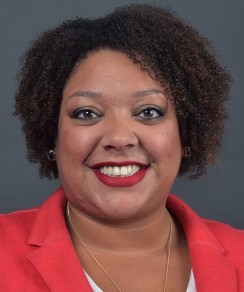
Maddy Day
The Impact of Campus-Based Support Programming on Foster Care Collegians' Postsecondary Access and Retention
In this episode, Chequita Brown of OCCRL talks with Maddy Day about the Fostering Success initiative in Michigan and the impact of campus-based support programming on foster carecollegians' postsecondary access and retention.
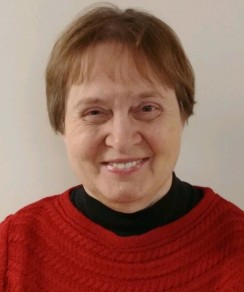
Patricia Palmer
How Youth-in-Care in Illinois Can Access Educational Resources to Pursue a Postsecondary Education
In this episode, OCCRL research assistant Chequita Brown continues the conversation on foster care youth by talking about with Patricia Palmer about accessing available resources in Illinois for youth-in-care who want to pursue a postsecondary education.
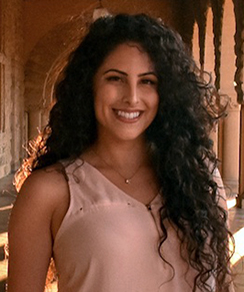
Nidia Ruedas-Gracia
Conceptualizing 'Sense of Belonging' Among Students From Historically Minoritized Racial Groups Within Higher Education
In this episode, Colvin Georges Jr., a research associate at OCCRL, talks with Dr. Nidia Ruedas-Gracia about what it means to have a sense of belonging and discusses her research in this area. They also discuss how a sense of belonging affects college students from historically minoritized racial groups.
Postsecondary Programs and Services for Current and Former Foster Care Youth in California
By Chequita S. Brown, Nidia Ruedas-Gracia, and Eboni M. Zamani-Gallaher
This brief highlights postsecondary programs and services in California that support youth in care, in addition to young adults who are aging out of foster care. Read more.
Tracking College-to-Career Pathways for Foster Youth
By Chequita S. Brown
In this OCCRL Thought Paper, Chequita S. Brown relates how tracking the data of students with foster care experience helps to recognize them as a legitimate student population. She offers recommendations on how to do this and conveys the many obstacles that can hinder the academic and career success of foster youth. Read more.
Black Youth in Foster and the School-Prison Nexus
By Royel Johnson
In this OCCRL Feature Brief, Dr. Royel Johnson argues that the foster care system, and more specifically congregate care facilities, are part and parcel to the enhancement of carceral state power. Read more.
Postsecondary Programs and Services for Current and Former Foster Care Youth in Illinois
By Chequita S. Brown, Eboni Zamani-Gallaher, Nidia Ruedas-Gracia, and Nathaniel M. Stewart
This research brief provides an overview of programs and services that helps strengthen postsecondary pathways for current and former foster youth in Illinois. Read more.
Foster Youth and Basic-Needs Insecurity
By Dra. Nidia Ruedas-Gracia, Chequita S. Brown, Dr. Mauriell Amechi, Dr. Eboni Zamani-Gallaher, and Nathaniel M. Stewart
This article discusses how COVID-19 has intensified the vulnerabilities of foster youth and former foster youth, many of whom are Black, Native American, Alaska Native, and multiracial children who have a higher rate of placement into foster care than White youth (Federal Interagency Forum on Child and Family Statistics, 2016). Read more.
(From the Fall 2020 UPDATE on Research and Leadership)
Exploring Equity in Postsecondary Education
By Heather L. Fox, Eboni M. Zamani-Gallaher
This chapter examines how postsecondary practitioners are encouraged to work collaboratively with child welfare agencies and other community-based organizations to identify and implement culturally responsive supports for former foster youth to promote early academic achievement. Read more.
The Forgotten Students: COVID-19 Response for Youth and Young Adults Aging Out of Foster Care
By Mauriell H. Amechi
This policy brief outlines recommendations for Congress to consider regarding the country's COVID-19 response, in an effort to prioritize the availability of essential supports and resources for youth and young adults who are aging out of foster care. Read more.
OCCRL’s Illinois Community College Leadership Institute the Start of Something Special
Last spring, OCCRL held the inaugural Illinois Community College Leadership Institute (ICCLI). The two-day event was at Parkland College in Champaign and brought together statewide community college scholars and practitioners who shared best practices in community college leadership.
ICCLI is modeled after a similar program in Iowa led by Iowa State University and Community Colleges for Iowa. OCCRL Director Lorenzo Baber directed the Community College Leadership Development program at Iowa State University for four years and witnessed its impact statewide.
“During my time in Iowa, we found that 80% of the senior leaders at Iowa community colleges, including presidents and chief academic officers, had participated in this leadership program,” Dr. Baber said.
Baber gave credit to one of his mentors, Dr. Larry Ebbers, who started the Iowa leadership program in 1995.
“Twenty-five years ago, Dr. Ebbers' understanding that the best community college leaders drive change by aligning scholarly research with practice was very forward-thinking," Baber said. "I hope we can build a similar legacy here in Illinois.”
Dr. Baber's vision came to fruition in May of 2023 at Parkland. Participants at the first ICCLI heard from esteemed administrators, faculty members, and practitioners such as Debra Bragg, a former director of OCCRL and now president of Bragg and Associates; Brian Durham, executive director of the Illinois Community College Board; and Lisa Castillo Richmond, executive director of Partnership for College Completion.
Other presenters included former OCCRL staff member Marci Rockey, now an assistant coordinator and academic advisor at Illinois State University, who spoke about leading student success across geographic context; Jim Reed, executive director of the Illinois Community College Trustees Association, who talked about relationships among board trustee members; Osly Flores, assistant professor of educational administration and leadership at Illinois and an OCCRL affiliate member, who discussed how to lead workforce education initiatives; and Xiaodan Hu, associate professor at Northern Illinois University, who covered finance and budgeting policy.
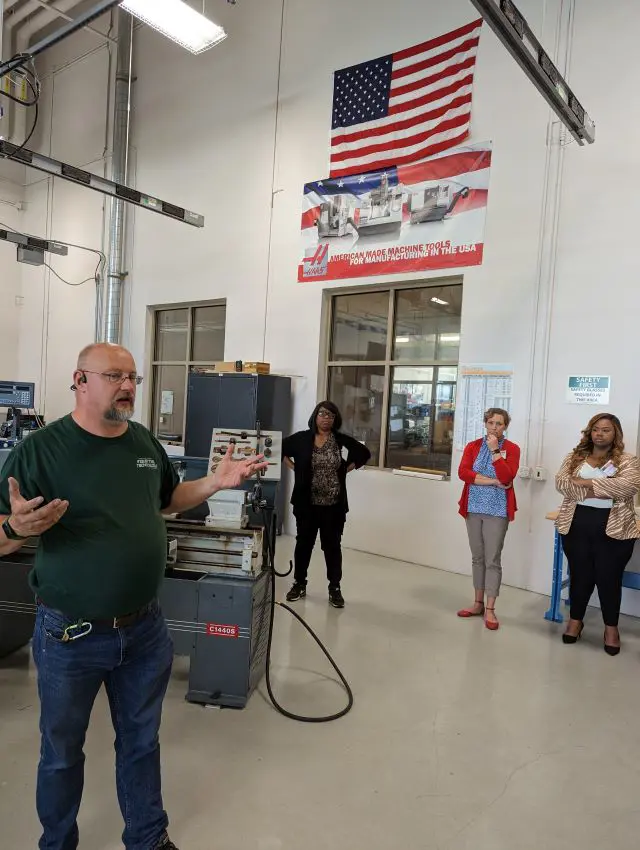
The agenda included a lively tour by John Dahlman (at left in nearby photo), who showed participants Parkland’s Career and Technical Education spaces, which included the school’s Manufacturing Lab and the Parkhill Applied Technology Center. The first day concluded with a panel session, “Journey to the Presidency,” led by Pamela Lau, the president of Parkland College, and Terry Wilkerson, the president of Rend Lake Community College.
The conference was deemed a success even before the conclusion of the first day. That evening, OCCRL staff members sat down with some of the participants and enjoyed the delicious flourless chocolate cake at Silver Creek Restaurant in Urbana. The conversation at the table quickly turned to thoughts of the future, and in a short amount of time a group of strangers became a cohort. People who had only met a few hours before were now a part of each other's success as community college practitioners, and they wanted to continue learning and leading within the community we had formed. As the conference coordinator, H.M. Kuneyl was eager to help facilitate that connection. Even so, she did not want to assume that all members of this new cohort had enough professional-development funds to permit them to make two trips to Champaign in one year. Thus, a follow-up virtual event was scheduled for the fall.
The October 11 event via Zoom was an abridged version of the spring gathering but no less informative and inspiring. Complete with a Zoom background of a Parkland classroom, the three-hour ICCLI in the fall, which had a theme of “Building Leadership Pathways for Community College Excellence,” featured three excellent guest speakers: Heather McCambly, an associate professor of educational foundations, organizations, and policy at the University of Pittsburgh, gave the talk “Building Relationships with Potential Funding Partners”; Lorenzo Baber, director at OCCRL and a professor in the Department of Education Policy, Organization & Leadership, presented “Building Equity Through Data-Driven Decision Making”; and Jasmine Collins, an assistant professor of organizational and community leadership in the College of ACES at Illinois, presented “Building Your Toolkit: Essential Perspectives for Education Leaders.”
These individuals provided excellent information during the sessions. One memorable statement came from Dr. McCambly, who said, “We are using data to speak to problems, not people.” This remark reminded attendees that grant writing requires a nuanced understanding of data. They should use data to evaluate programs and elevate needs, but data alone cannot replace the lived experiences of campus community members, according to Dr. McCambly.
The session by Dr. Baber focused on building equity through data-driven decision-making. Toward the end of the talk, he provided a link to participants to a still-relevant 2018 brief by Dr. Anjale Welton, “ Data-Driven Decision-Making in Career and Technical Education.” The piece by the former OCCRL associate director describes what data-driven decision-making entails, highlights trends in postsecondary education, and provides equity frameworks.
Other relevant and prudent words came from Dr. Collins, who said that “leadership is a process, not a person.” This highlighted the iterative progression of leadership and demonstrated that no one has all the answers.
The insightful discussions were offset by a quick icebreaker centering on community college mascot trivia – proving that pretty much all attendees need to brush up greatly on their community college mascots.
The virtual session was small but enthusiastic, with 14 participants who engaged in active discussions until the last minutes of the event. It was a welcoming space and a reminder that what started as a chance to learn within a community setting became an opportunity to build lasting relationships.
View photos from the May event at Parkland College.
View photos from Silver Creek Restaurant.
